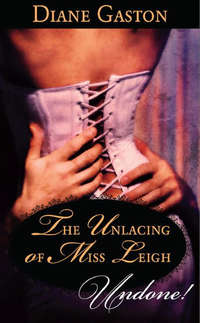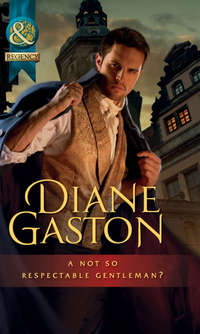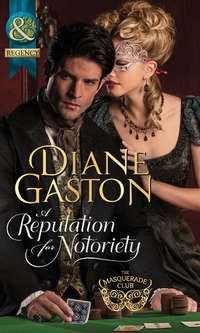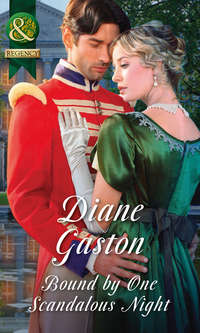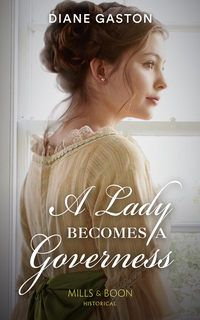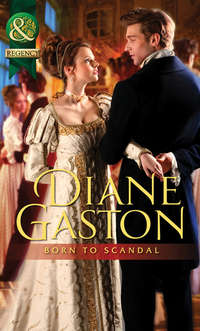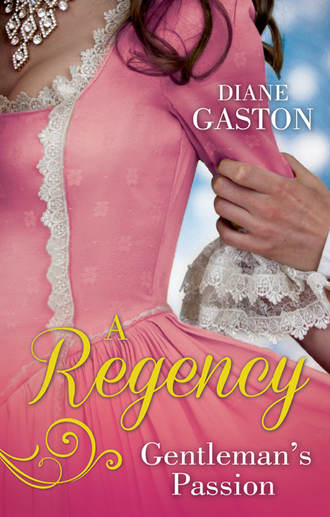
Полная версия
A Regency Gentleman's Passion: Valiant Soldier, Beautiful Enemy / A Not So Respectable Gentleman?
“Fire at the horses,” Gabe shouted to his men. Without his horse, a cavalryman was helpless.
Gabe wound up in the same square as Landon, who, thank God, was unscathed. Gabe might have got his wish about General Tranville. He’d been seen falling from his horse during that first infantry charge and no one had seen him since. His son Edwin, coward that he was, had disappeared at the beginning of the battle. Gabe presumed he was hiding somewhere that cannon fire and musket balls could not reach.
“Fire at the horses,” Gabe yelled again. “Stand fast.”
Gabe’s square held and, as far as he could tell, the other British squares held as well, even though the French charged again and again. Between charges Landon rode off to render assistance to Hougoumont, which was now on fire. Gabe stayed with his company, their numbers dwindling with each attack, the square becoming smaller and smaller.
The ground around them was littered with dead and dying horses and men, their screams melding with the boom of cannon and crack of musket fire. The air filled with smoke and it was difficult to see much further than ten to twelve feet.
Between cavalry attacks, Gabe worried that the French would train their artillery on the squares, or that more columns of infantry would join the charge. Neither happened. Just more cavalry. As the latest onslaught neared, a gap formed on one side of the square. Gabe rode to it. “Close the gap,” he ordered.
A cuirassier on a dark bay horse rode directly for the opening, but Gabe’s men fired on him as they closed ranks again. The rider jerked like a rag doll as several balls hit him. The horse was such a beauty, Gabe was glad his men had missed it. Its rider tumbled from the saddle as the horse ran on. The man rolled towards the square, landing about four feet from Gabe. His helmet came off and bounced into the body of a French comrade.
Facing Gabe was the youthful countenance of Claude Mableau. The boy struggled to rise. One of his men aimed his musket at him.
“Do not fire,” Gabe cried, dismounting. “He’s no threat.” He ran out of the square and grabbed Claude by the collar, dragging him inside to where the other wounded lay.
“A Frenchie, Captain?” one of the man asked.
“Spare him,” Gabe ordered, not caring if the man thought him soft on the French. “He’s just a boy.”
Emmaline’s boy.
Chapter Six
She’d heard the guns all day, the booming of cannon fire, like the thunder of the two previous days without the rain.
Everyone said this was the big battle, not the one two days before when the cannons were also heard. It seemed to Emmaline that plenty of wounded men came into Brussels after that one. If this were the big battle, it could only get worse.
Tante Voletta had insisted they close the shop and pack up all the lace to hide in the attic.
“Those English will use our lace for bandages, I am sure of it,” her aunt had said. “They are gauche.”
For two days they packed away lace. It helped make the time pass, but now that the task was done, nothing was left to distract her. Emmaline’s heart seized with fear at each battle sound. Did that cannon ball strike Claude? Was he anywhere near it? Would he come back to her? Or had he died already, in that first battle? Had he been placed at the front of the charge so the musket balls would hit him first?
He was a soldier’s son, she forced herself to remember. Perhaps he was born with a soldier’s sense of self-preservation. Besides, she would know if he died. She was certain she would feel his life leave his body as profoundly as she felt when she gave birth to him.
Tante Voletta sent her out to purchase stores of food. Many of the English had fled to Antwerp, but still what shops were open had few supplies. Perhaps other shopkeepers had hidden their stock, as well.
The streets remained busy with wagons carrying supplies, people fleeing or wounded arriving. Rumours were everywhere. On one corner it was believed that Napoleon was at the city gates; on another corner the Allies had him in retreat. Either way the rumours went made Emmaline feel sick inside. There could be no possible victory for her in this battle.
A wagon of wounded British soldiers came into view. Emmaline ran alongside it. “What news of the battle?” she asked them.
“Bloody hard going,” one of the soldiers answered, which told her nothing.
Their red coats reminded her of Gabriel. Perhaps they knew how he fared. “Are you Royal Scots?”
“No, ma’am,” he answered.
The wagon rolled on.
Emmaline put her fingers on her chest, feeling for the beautiful ring she wore on a chain around her neck, hidden under her clothing. Somehow she did not believe a mere war could kill Gabriel Deane. He was too clever, too strong and too good a man to be lost to battle. She only wished they could have parted with loving words, not the harsh ones that had escaped her lips when she refused his proposal.
She closed her eyes and could still see the wounded look on his face. Why had he not understood? It was impossible for her to marry Gabriel, a British soldier, when her son so vehemently hated him. Gabriel should have known that.
The sound of a hundred hooves thundered in her ears. She dropped her basket as an entire regiment of Hanoverian cavalry galloped past her. Emmaline froze, expecting to see Napoleon himself on the heels of these German horsemen.
No one came.
She bent down to retrieve her basket and was seized with a sharp anxiety, like shafts piercing her skin. No more shops—she just wanted to go home, to wait in solitude for some final word of who was winning and who was losing, who was alive and who had died. Whether Claude would return to her.
The towers of St Michael’s Cathedral loomed above her. She glanced up at them and whispered a prayer that God would deliver Claude back to her.
She added a prayer for Gabriel. Not for him to return, but for him to live.
She crossed herself and hurried to the lace shop, walking around the back and entering the yard through the gate. After opening the rear door of the shop, she climbed the stairs to her aunt’s rooms.
“This is all you could purchase?” Her aunt took the basket from Emmaline’s hands and peered inside it.
She wrapped her arms around her still-shaking chest. “There was not much to buy.”
A cannon boomed and they both turned towards the sound.
“I am weary of that!” her aunt exclaimed. She examined each item in the basket. “Did you hear any news of the battle?”
Emmaline shook her head. “No one knows the outcome.”
“Pfft!” Tante Voletta waved a hand. “Napoleon will win.”
Emmaline kept silent. She did not want the French to win. Claude would never leave the army if that happened. “Do you need my company? Because I would rather go to my own rooms.”
“Go,” her aunt said. “But come to me when you learn of the victory.”
Emmaline, however, did not go out in search of news.
She spent the evening on her sofa, hugging her knees and repeating her prayers. She lay down and pressed her hand against the ring under her dress. As she felt its circle in her fingers, she watched the flame of a single candle. The cannonade stopped and as darkness fell she could hear the rumble of wagons passing through the streets. Her candle grew shorter and shorter and soon her eyes grew heavy. She fought to stay awake. How could she sleep while the fate of her son was in question?
The sounds in the street were rhythmic and lulling. Her eyes closed.
And flew open again.
A loud rapping at the door startled her awake. She sat up, heart pounding.
“Emmaline,” she heard a man’s voice. “Open the door.”
Gabriel!
She flew to the door and pulled it open.
He was a mere shadow in the dark yard, but as he stepped inside, she could see he carried something over his shoulder.
Her eyes widened.
“I’ve brought your son.”
“Claude!” Her hands clasped over her mouth. Was he dead? “Claude!”
“He’s wounded.” Without another word he carried him upstairs.
She grabbed the candle and followed. Claude’s head lolled back and forth with each step Gabriel made.
Gabriel opened the door to Claude’s room and placed him on the bed. Immediately he began to undress him.
Emmaline lit more candles, her hands trembling. “Where is he hurt?”
“His head.” He ripped away Claude’s bloody shirt. “His neck. And leg.”
She stood by the bed, finally able to touch her son. She helped pull off his trousers, stained with his blood. He’d been shot in the thigh, but a quick examination showed that the musket ball had passed through. On his neck, right above his collarbone, was another wound. She placed a finger near the spot.
Claude flinched and moaned—signs of life, at least.
“Water.” Gabriel’s voice sounded forced. “Need to wash. See the wounds better.”
She sprang to her feet. “I’ll fetch some.”
She returned with a stack of towels, a pitcher of water, a basin and cup. As she placed them on the bedside table, Gabriel swayed and looked as if he might collapse to the floor.
She hurried to him, helping him regain his balance. “Are you injured, Gabriel?”
He shook his head. “Tired.”
“Sit in the chair.” She eased him over to a wooden chair near the bed and ran to pour him a cup of the water.
He drank it greedily, but gestured for her to return to Claude.
Emmaline washed away blood and mud and bits of grass and cloth from her son’s skin and from his hair. Beneath his matted hair was a long gash. A musket ball had scraped him, but had not penetrated. His thigh had a huge hole in it from which blood still oozed. His chest was riddled with round red spots, turning to bruises.
“His chest plate stopped some of the musket balls,” Gabriel said. The cuirassiers wore steel chest plates, like the armour of medieval times.
The most worrisome wound was the one on his neck. The musket ball needed to come out.
She turned to Gabriel. “He needs a surgeon.”
He rubbed his face. “Won’t find one. There are thousands who need a surgeon. Most worse off.” His gaze met hers. “Too many.” A haunted expression came over his face.
Emmaline could not allow herself to think of what horrors he’d seen. She must think only of Claude, how to keep him alive.
She forced herself to remain calm. “I will remove the ball.”
“Emmaline—” he began in a warning tone.
She set her jaw in resolve. “There is no other choice. I have seen it done before. I must try.”
She ran from the room and gathered any items she could think of that would help her remove the ball: her knitting needles, a long embroidery hook, tweezers, scissors. The sky was turning light. At least she would be able to see better.
Back in Claude’s room, she pushed the bed to the window and set her tools on the bed next to her son.
Gabriel rose from the chair. “I’ll hold him still.”
How he would have the strength to do so, she didn’t know, but he stood on the opposite side of the bed and held Claude’s shoulders. She carefully inserted the knitting needle into the wound to find the path of the musket ball. Claude’s eyes opened and he cried out. Gabriel held him fast.
Swallowing against a sudden wave of nausea, Emmaline did not have to probe far. “It is not deep!”
Her tweezers were about five inches long, plenty of length to reach the ball. It took several tries to pull it out, all the while Claude writhing with the pain of it. He quickly lost consciousness and became limp. Finally she manoeuvred the ball to the opening and was able to hold it between her fingers. Gabriel released Claude and leaned against the wall.
“One more thing if you can stand it,” she said to Gabriel. “I want to sew his head wound closed.”
Gabriel’s arms trembled as he held Claude’s head while Emmaline put thread and needle through the skin, but Claude did not regain consciousness.
“Sit down now,” she told Gabriel after she was done.
She bandaged the wounds and covered Claude with clean linens and a blanket. He again moaned, but it was a relief to hear him make any sound. Later, as she had done when he was ill as a child, she would spoon broth down his throat and wipe his brow with cool compresses if he became feverish. There was little else she could do.
She stepped back from his bed.
Gabriel rose. “I must leave.”
She touched his arm. “Take some food first. Something to drink.” She wanted to tell him not to leave her, to stay. With his steadying presence, she felt as if she could do anything to keep Claude alive. Without him, she was alone.
She walked downstairs with him and made him sit at the table where he’d sat so many happier times before.
“Just something to drink,” he said.
She gave him wine and he drank it like water.
“Now I must go.” He stood again and walked towards the door.
“Gabriel.” She ran to him as he opened the door. “Who won the battle?”
He gave her a weary look. “The Allies.”
She was relieved. When—if—Claude recovered, he would not return to the French army. There would be no need if the British had won. He could have a normal, peaceful life.
Gabriel put his hand on the doorknob again.
“Gabriel!” she called again.
He turned.
She swallowed against a threat of tears. “Thank you for my son.”
He touched her face with a gentle hand and started to walk away.
She seized his arm. “Gabriel. How did you find him? You said there were so many …”
Again a bleak look crossed his face. “The cuirassiers attacked. I saw him fall near me.”
“They let you save him?” Surely it would be difficult to protect a Frenchman when so many were in need.
His eyes turned hard. “No one could stop me.” He crossed the threshold and made his way to the gate and out of her life.
Emmaline leaned against the door jamb, tears burning her eyes, a sob choking her throat. What had he risked for her?
To save her son.
Chapter Seven
London—June 1817
Two years after the battle of Waterloo, Gabe’s life could not have been more altered. Waterloo had ended the war and Napoleon had been exiled to Saint Helena, far enough away in the south Atlantic to pose no further threat. For a time, Gabe’s Royal Scots had been part of the Army of Occupation in France. Gabe wished they’d been sent somewhere more distant, not so close to Brussels, not so filled with reminders of what he most wanted to forget.
The orders finally came that the whole battalion would be shipped to Canterbury. Once there, however, Gabe’s battalion was disbanded and he was placed on half-pay. In what seemed like an instant he had no regiment, no orders and literally nothing to do.
Now he was in London and, like other officers let loose in a non-military world, was haunting the Horse Guards hoping to discover a regiment looking for officers, or visiting the War Office to get the forms necessary to write to regimental agents for a commission to purchase. On this warm June afternoon Gabe strode into the War Office to pick up more copies of the form the office had run out of the week before. Gabe had performed this same errand the day before and the day before that, without success. He was not optimistic that this day would yield a different result.
Three other officers of his acquaintance were on their way out.
“Deane!” one of them cried, slapping him on the back. “Come for more forms, have you?” He spoke with a thick Irish accent that had earned him the nickname ‘Irishman’.
“Indeed,” Gabe responded without enthusiasm. “Are you going to tell me they have a new supply?”
Another man, Major Hanson, stepped up. “Not going to tell you that. Webberly even offered a bribe if the fellow would find him one copy, but apparently there are still none to be had today. Maybe tomorrow, the fellow said.”
Webberly, the third of the trio, shook his head. “I was certain a bribe would work.”
Gabe gave him an impassive look. “I’d be grateful for the opportunity to pay a bribe.” What else was he to do with his money?
Hanson jostled him. “Do not speak so loud. The clerks will smell a profit.”
The clerks already knew of Gabe’s willingness to bribe them for more forms. He’d made the offer days ago.
Irishman laughed. “Now, Captain Deane, my dear fellow, are you so eager for a commission? It would mean leaving our company and the fine accommodations of the Stephen’s Hotel.”
They all had rooms in the Stephen’s Hotel on Bond Street, a place popular with military men.
Gabe responded with sarcasm, “Not at all. I’m merely pining for the lost luxuries of army life.”
“You are wasting your time today, Deane,” Hanson told him. “Come with us. We plan to make great use of a tavern and deprive it of several pints of ale.”
It was tempting to seek the oblivion that alcohol could bring. Most of the officers at Stephen’s Hotel drank too much, but, after Brussels, Gabe had learned that whatever you wanted to drown with drink was still with you when morning came. Along with the devil of a headache.
“Not this time.”
The men bid him goodbye, and Gabe proceeded to the clerk’s desk anyway.
The clerk barely glanced at him. “No forms today. Maybe tomorrow.”
Gabe tapped on the man’s desk with a finger. “If the forms do arrive tomorrow, will you save me some?”
The clerk raised one brow. “For the amount we agreed upon?”
Gabe gave him a level stare. “Indeed.”
The clerk grinned. “We have a wager going here as to who among you officers will be the first to break down and accept a commission to the West Indies.”
The 1st battalion of the Royal Scots was stationed in the West Indies. There were always commissions open there, because so many officers caught fevers and died.
Gabe had survived that dreadful place once; he had no desire to chance it again, even if it would free him from the tedium of London.
Gabe had already travelled to Manchester, the home of his youth and where his family still resided, a place he’d not seen for at least ten years. It was nearly like going to a foreign land. Factories and warehouses had sprouted everywhere. Nieces and nephews had sprouted as well, too many for him to count. His mother and father had turned shockingly old and neither they nor his brothers or sisters seemed to know what to do with him.
He’d wound up spending most of his time with a twelve-year-old nephew who asked question after question about every battle on the Peninsula and every detail of Waterloo. The boy had reminded him of Emmaline’s Claude, or, more accurately, what he imagined Claude might have been like if not for Badajoz.
After a few weeks of intense discomfort on all sides, Gabe made an excuse to leave. He suspected the family was relieved he was no longer there to distract them from the routines of running what was now a very prosperous drapery warehouse. With Manchester’s new mills and a canal that improved the shipping of goods, the town seemed to have turned into a Garden of Eden for cloth merchants.
After Manchester, Gabe visited his uncle on the hill farm. Even that idyll was about to be lost. Stapleton Farm was up for sale and his uncle would soon be vying with younger men by the scores who were also seeking employment. Had matters turned out differently in Brussels, Gabe might have bought the place. He’d learned his lesson, though. He belonged in the army. No sense dreaming otherwise.
He’d returned to London and the tedious days of applying for a commission. What odds were offered that he would be the one to break down and go to the West Indies? Surely he’d be a safe bet.
“I’ll be back tomorrow,” he said to the clerk who’d already turned his attention back to the papers on his desk.
“Undoubtedly,” the man replied.
Gabe walked out of the office and back on to the street. He took a breath.
Lawd. He needed more to do. Exercising his horse in the morning and visiting the War Office or Horse Guards in the afternoon was simply not enough.
Most of his fellow officers attended society balls and other entertainments in the evenings, hoping to find a wealthy heiress to marry. Even that occupation was closed to Gabe. With the glut of younger sons in town, the son of a merchant was no matrimonial prize. Besides, marriage was not in the cards for him. He’d learned that lesson in Brussels.
Gabe walked slowly back to the hotel, ignoring the book shops, ironmongers, milliners and tea shops on Bond Street. Head down, he approached the entrance of Stephen’s Hotel, hoping not to see anyone he knew. He was not in a humour for friendly discourse on the weather or any other subject. As he entered the hotel, he removed his shako and threw his gloves inside it. Holding it under his arm, he crossed the hall, making his way to the stairway.
“Captain!” The footman who attended the lobby called after him. “Captain!”
He’d almost made good his escape. Turning, he fixed his fiercest glare on the unfortunate fellow.
The man took a step back. “Ah, sir.” He bowed. “You have a caller. Waiting in the front parlour.” The footman gestured to the room and withdrew posthaste.
Gabe clenched his hand into a fist. Who did he know in London who would call upon him? Allan Landon, perhaps? He’d seen Allan a few weeks ago, but neither of them had shared their direction. He knew other officers, but they were all staying in this hotel. If they wished to waste his time, they would simply knock at his door.
He rubbed his forehead.
On the other hand, he had written countless letters trying to find a commission. Maybe his caller had an answer for him.
He entered the room, dropping his hat on a table inside the door.
The parlour looked empty at first, although the curtains were open and fresh flowers were in a vase on the mantel.
A sound came from the high-backed chair facing the fireplace. A swish of skirts and a peek of a bonnet.
A woman?
She stood before him. “Bon jour, Gabriel.”
Emmaline.
She looked even more beautiful than the image of her that inhabited his dreams at night. Her lace-lined bonnet of natural straw perfectly framed her flawless face. The dark blue of her walking dress made her eyes even more vibrant.
Good God. After two years, she still had the power to affect him.
“What are you doing here?” His tone came out more sharply than he intended.
She clasped her white-gloved hands together. “I came to see you, Gabriel.”
He shook his head. “I meant, why are you in London?”
She fingered the front of her dress. “To see you.”
She had come to see him?
Gabe had laboured hard to bury the deep wound of losing her, but now she was here. Was it possible she’d regretted sending him away? Enough to travel this long distance to find him? Enough to search for him, to discover where he lived?
Against his better judgement, a tiny seed of hope germinated.
He managed to disguise the fact. “How did you find me?”
“With luck.” She smiled wanly. “A maid at my hotel said many officers stayed here.”
He really did not care about how she had found him. Only one question truly burned inside him. “Why did you come to see me?”
Her lips trembled before she spoke. “Oh, Gabriel. I need you.”
The hard earth he’d packed around his emotions began to crack.
She swallowed and went on, “I need your help.”
He came to his senses. “Help with what?”
She met his eye. “I need you to find Claude.”
“Claude.” The son who’d driven a wedge between them.
Of course it would be for Claude that she would travel all this way, to a foreign country that had so recently been at war with her birthplace.
She stepped closer to him. “It is so terrible. He is here in En gland.” Her gaze still managed to hold him in thrall. “Do you remember how he was so filled with hatred?”


